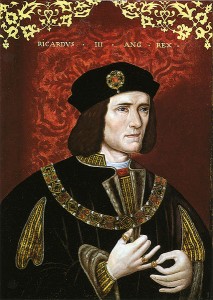 On 2 October 1452, Richard III, the last Plantagenet king, was born at Fotheringhay Castle, Northamptonshire.
On 2 October 1452, Richard III, the last Plantagenet king, was born at Fotheringhay Castle, Northamptonshire.
Richard was the youngest surviving child of Richard, 3rd Duke of York, and Cecily Neville.
Richard claimed the English throne in June 1483, claiming that his brother Edward IV’s sons were illegitimate because Edward had been pre-contracted to another woman when he married Elizabeth Woodville. Richard III was killed at the Battle of Bosworth on 22nd August 1485, and Henry Tudor claimed the throne as Henry VII.
Richard III’s remains were found in an archaeological dig in 2012. He had been buried in the church of the Priory of the Greyfriars in Leicester and the dig in a car park in Leicester found his remains in what had been the choir of the church. His remains will be laid to rest on 26th March 2015 in Leicester Cathedral.
You can read more about Richard III in the following articles:
- Richard III has been Found
- Richard III’s Burial Place by Josephine Wilkinson
- 22 August 1485 – The Battle of Bosworth: The Death of Richard III and Accession of Henry VII
Also on this day in history…
- 1501 – Catherine of Aragon arrived in England, landing at Plymouth in Devon. She had come to England to marry Prince Arthur, the heir to the throne of England.
- 1514 – Mary Tudor, sister of Henry VIII, set off from Dover to sail to France to marry King Louis XII. She was eighteen and he was fifty-two, and not in the best of health. They married on 9th October 1514, but the marriage was short-lived as Louis died in January 1515. Mary went on to marry Charles Brandon, the Duke of Suffolk, on the 3rd March 1515.
- 1521 – Pope Leo X was given Henry VIII’s Assertio septem sacramentorum or “Defence of the Seven Sacraments” in Rome. This work led to Henry VIII being proclaimed Fidei Defensor or “Defender of the Faith”.
- 1528 – Publication of William Tyndale’s “The Obedience of the Christian Man and How Christian Rulers Ought to Govern”. This book said that rulers were accountable to God, not the Pope. Anne Boleyn owned a copy of this book, as well as Tyndale’s “New Testament”, and it is this book which she intended to show Henry VIII, marking key passages for his attention. The book got into his hands when it was confiscated from George Zouche, suitor of Anne Gainsford who had borrowed it from her mistress, Anne Boleyn. Henry VIII read it and declared “This book is for me and all kings to read.” See Anne Boleyn, William Tyndale and Henry VIII.
- 1536 – Start of the Lincolnshire Rising, the beginning of the Pilgrimage of Grace. It was sparked off by a sermon at evensong on the 1st October at St James’s Church, Louth, and by a visitation from a registrar on 2nd October.